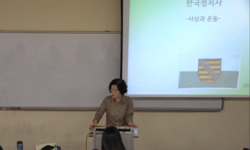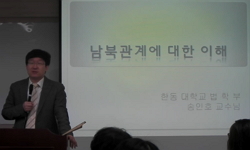분단 이후 남과 북은 적어도 외면적으로는 통일을 내세우면서 한반도 내 하나의 국가만이 존재하고 있다는 분단국 논리를 견지해 왔다. 그러나, 최근 양측에서 ‘2국가론’을 수용하자는 주...
http://chineseinput.net/에서 pinyin(병음)방식으로 중국어를 변환할 수 있습니다.
변환된 중국어를 복사하여 사용하시면 됩니다.
- 中文 을 입력하시려면 zhongwen을 입력하시고 space를누르시면됩니다.
- 北京 을 입력하시려면 beijing을 입력하시고 space를 누르시면 됩니다.

남북 2국가론의 헌법적 수용가능성과 그 한계 = The Constitutional Acceptability and Limitations of the Two-State Theory in North and South Korea
한글로보기https://www.riss.kr/link?id=A109554915
- 저자
- 발행기관
- 학술지명
- 권호사항
-
발행연도
2025
-
작성언어
Korean
-
주제어
North Korea-South Korea Relations ; Korean Reunification ; Two-states Theory ; Statehood ; Divided state ; Korean Constitution ; Territorial Clause ; Unification Clause ; 남북관계 ; 남북통일 ; 2국가론 ; 국가성 ; 분단국 ; 한국헌법 ; 영토조항 ; 통일조항
-
등재정보
KCI등재
-
자료형태
학술저널
-
수록면
27-60(34쪽)
- DOI식별코드
- 제공처
- 소장기관
-
0
상세조회 -
0
다운로드
부가정보
국문 초록 (Abstract)
분단 이후 남과 북은 적어도 외면적으로는 통일을 내세우면서 한반도 내 하나의 국가만이 존재하고 있다는 분단국 논리를 견지해 왔다. 그러나, 최근 양측에서 ‘2국가론’을 수용하자는 주장이 쟁점으로 떠올랐다. 이 논문에서는 소위 ‘남북 2국가론’ 문제에 대한 접근의 관점과 기준을 정립하고, 그에 기초하여 ‘남북 2국가론’이 우리 헌법하에서 수용가능한지와 수용가능한 조건과 한계를 검토하였다. 우선, ‘분단국’ 문제는 인간의 문제라는 점을 인지하는 데서 시작하여야 한다. 또한 법과 정치, 헌법과 국제법이 교차하는 영역의 문제이며, 우리 헌법질서가 허용하는 테두리 안에서 해결되어야 한다. 남북 2국가론이 헌법적으로 수용가능한지 살피기 위하여는 전체 한국의 역사 속에서 남과 북의 법적 지위에 대한 고찰이 필요하다. 역사적, 헌법적, 국제법적, 비교법적 검토 결과, ‘전체로서 한국’은 법적으로 소멸한 적이 없고, 계속 존속하였다고 보는 것이 전제가 되어야 할 것이다. 1948년 이후 남과 북이 국제법적으로 각각 국가로 인정받고 있지만, 헌법상 남북관계는 대한민국헌법의 해석을 통해 정립되어야 한다. 헌법 제3조의 영토조항의 규범적 효력은 원칙적으로 인정되어야 하고, 제4조 통일조항의 법적 효과의 양면성을 고려하여, 후자가 전자의 원칙적·법적 효력을 일부 잠정적으로 제한하는 것을 허용하는 헌법적 근거로 볼 수 있다. 즉, 통일조항은 북한을 국가는 아니지만 국가에 준하게 취급할 수 있는, 외국은 아니지만 준외국으로 취급할 수 있게 하는 헌법적 근거로 볼 수 있다. 따라서, 대한민국헌법 하에서는, 북한을 외국으로 인정한다는 의미에서의 2국가론은 허용될 수 없으며, 다만 통일조항에 근거하여 특수한 사정이 있을 경우 북한에 외국에 준하는 지위를 인정하여 사실상 국가에 준하는 실체로 취급할 수 있다는 차원에서만 가능할 것이다.
다국어 초록 (Multilingual Abstract)
Firstly, it must be recognized that the problem of the ‘divided state’ is a human problem. It is also a problem at the intersection of law and politics, constitutional and international law, and must be resolved within the framework of Korean constitutional order.
In order to examine the constitutional acceptability of the two-state theory, it requires an examination of the legal status of North and South Korea throughout the history of Korea as a whole. Based on historical, constitutional, international and comparative analysis, it must be assumed that ‘Korea as a whole’ has never legally ceased to exist and has continued to exist. Although the North and South have been recognized as distinct states under international law since 1948, under the Korean Constitutional framework, the relationship between the two Koreas must be established through the interpretation of the Korean Constitution.
The normative effect of the territorial clause, Article 3 of the Korean Constitution should be recognized as principle, and in view of the ambivalence of the legal effect of the unification clause, Article 4, the latter can be seen as a constitutional basis for allowing some provisional limitation of the principle and legal effect of the former. In other words, the Unification Clause can be seen as a constitutional basis for treating North Korea as a quasi-foreign entity that is not a state but can be treated as such.
Therefore, under the Korean Constitution, the two-state theory in the sense of recognizing North Korea as a foreign state is not acceptable, but only in the sense that, under the Unification Clause, it is possible to grant North Korea a foreign-like status under special circumstances and treat it as a de facto state-like entity.
Since the division of Korea, both the North and the South have maintained the idea that there is only one country on the Korean Peninsula, at least outwardly, claiming to aim for reunification. However, the idea of adopting a ‘two-state theory’ ha...
Since the division of Korea, both the North and the South have maintained the idea that there is only one country on the Korean Peninsula, at least outwardly, claiming to aim for reunification. However, the idea of adopting a ‘two-state theory’ has recently become a contentious issue. This article sets out the perspectives and framework for approaching the so-called ‘two-state theory’ issue and examines whether it is acceptable under the Korean Constitution and the conditions and limits of its acceptability.
Firstly, it must be recognized that the problem of the ‘divided state’ is a human problem. It is also a problem at the intersection of law and politics, constitutional and international law, and must be resolved within the framework of Korean constitutional order.
In order to examine the constitutional acceptability of the two-state theory, it requires an examination of the legal status of North and South Korea throughout the history of Korea as a whole. Based on historical, constitutional, international and comparative analysis, it must be assumed that ‘Korea as a whole’ has never legally ceased to exist and has continued to exist. Although the North and South have been recognized as distinct states under international law since 1948, under the Korean Constitutional framework, the relationship between the two Koreas must be established through the interpretation of the Korean Constitution.
The normative effect of the territorial clause, Article 3 of the Korean Constitution should be recognized as principle, and in view of the ambivalence of the legal effect of the unification clause, Article 4, the latter can be seen as a constitutional basis for allowing some provisional limitation of the principle and legal effect of the former. In other words, the Unification Clause can be seen as a constitutional basis for treating North Korea as a quasi-foreign entity that is not a state but can be treated as such.
Therefore, under the Korean Constitution, the two-state theory in the sense of recognizing North Korea as a foreign state is not acceptable, but only in the sense that, under the Unification Clause, it is possible to grant North Korea a foreign-like status under special circumstances and treat it as a de facto state-like entity.
동일학술지(권/호) 다른 논문
-
총유(總有) 제도를 매개로 한 남북한 소유권 법제통합 방안
- 법무부
- 김진규
- 2025
- KCI등재
-
북한 지방정부의 권한 변화와 재정확충: 지방예산 및 편의봉사 법령 분석을 중심으로
- 법무부
- 윤세라
- 2025
- KCI등재
-
독일 헌법애국주의의 남북 통일 방안에 대한 시사점 - 한반도 가치공동체 통일방안을 제시하며 -
- 법무부
- 박민
- 2025
- KCI등재




 KCI
KCI





